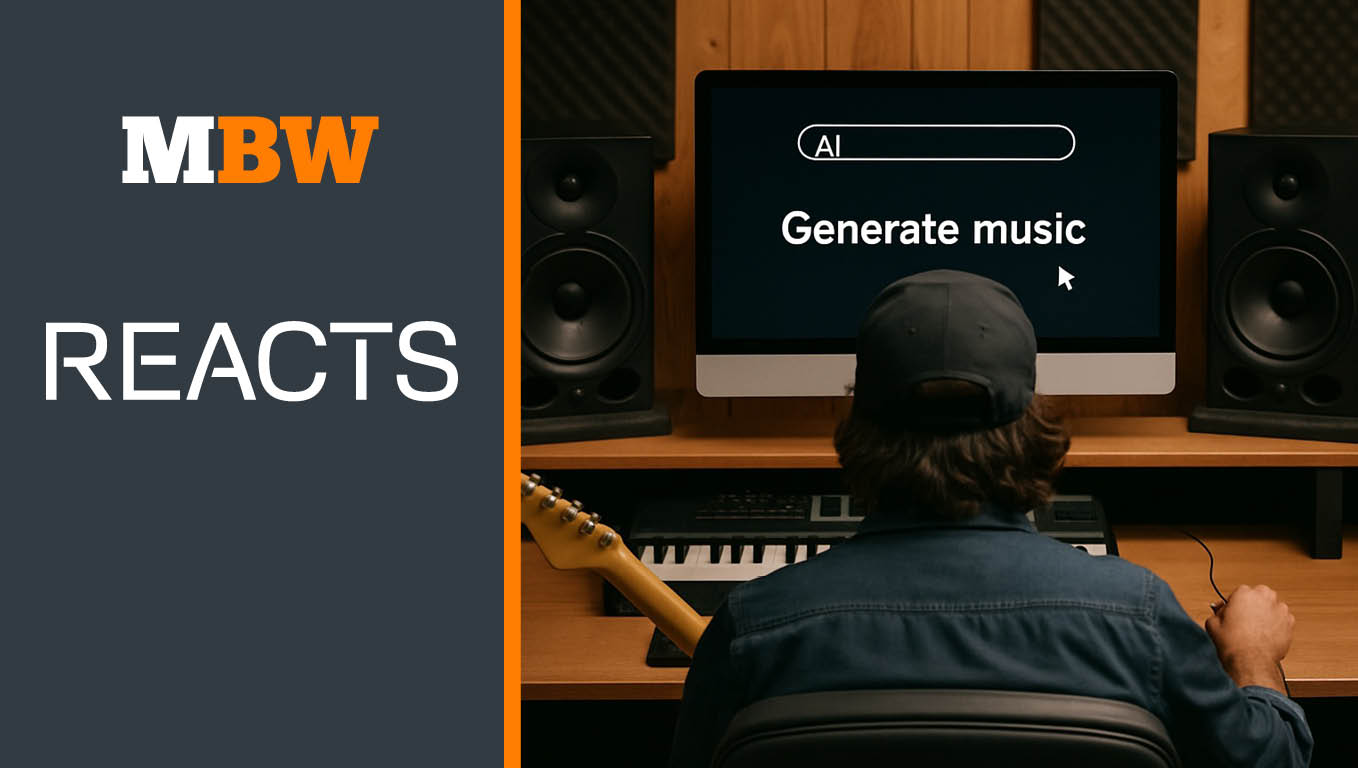Tencent Music And Deepseek Integration
Last month, we shared news about the collaboration between Tencent Music Entertainment and Deepseek.
Deepseek is an AI platform headquartered in China that raised concerns across the AI sector earlier this year when its chatbot showcased that advanced AI systems could be developed with significantly lower costs and computational resources than previously anticipated.
The chatbot’s introduction led to suspicions that the Deepseek model was trained using OpenAI data without authorization, an ironic twist considering the ongoing lawsuits related to copyright violations involving OpenAI. One such lawsuit was filed by the German Society for GEMA last November.
TME General Director Ross Liang explained following last month’s profits that Deepseek has become a central component in creating AI-generated music.
Expansion of AI Capabilities
In its Environmental, Social, and Governance (ESG) report published today (April 23), the company elaborates on how its AI capacities have evolved throughout its operations…
You can read the full TME ESG report here, which details significant investments in AI, encompassing sound optimization, fidelity of sound, recommendations, music creation, and much more.
Regarding music creation tools, TME notes, “As demand for user-generated content rises, an increasing number of individuals are eager to engage in music creation.”
The ESG report from TME states, “By utilizing the capabilities of Deepseek, particularly in lyric generation, alongside AI music composition tools, users can produce original songs that resonate with their emotions and personal experiences, thereby enhancing their development as creative individuals.”
TME mentions that QQ Music was the first platform in China to integrate the Deepseek model.
Tencent Music Venus Launch
The company, which operates flagship music applications like QQ Music, Kugou, Kuwo, and online karaoke platform Wesing, is also launching a platform dedicated to the creation and production of AI music under the name Tencent Music Venus.
This platform features various AI music tools, including AI Tonal Mage, a Musical Division plugin, and AI Songwriter—all designed to assist musicians in their creative processes.
TME AI Songwriter enables musicians to input a “brief description of their creative idea or individual lyrics,” allowing the tool to generate AI-created original songs that include both lyrics and vocals.
According to TME, these AI-generated songs can then be effortlessly published on QQ Music with just one click.
TME collaborates directly with independent artists, providing a program called “Tencent Musician Platform” that enables them to distribute their music directly to TME services like QQ Music.
TME anticipates having 580,000 indie acts on the platform by December 31, 2024, an increase of 100,000 from the previous year.
“Users can create original songs generated by AI, which include both lyrics and vocals, that can then be easily published on QQ Music with just one click.”
TME ESG Report
TME states that it provides these indie artists “full support in four key aspects,” including “traffic, performances, creation camps, and multifaceted services.”
The 580,000 indie artists also have access to numerous AI technologies.
TME detailed in its ESG report that “we have unveiled intelligent tools for lyric writing, composition, arrangements, and content generation for short music clips, album covers, and posters.”
“These innovations expand the potential for musicians in both the creation and promotion of their work. Furthermore, we have introduced noise reduction functions and music transcription capabilities that enhance efficiency in the music creation process.”
TME’s AI Tonal Mage technology enables users to record a voice clip ranging from 30 seconds to 4 minutes to generate a personalized vocal tone. After selecting a preferred song, the system can create an AI-generated version of the track with a single click.
TME Music SDIZE Cloud Application supports the isolation of vocal tracks from loaded songs, allowing users to separate instrumental layers, including drums, bass, guitar, piano, and other primary tools, with the capability to separate up to eight different audio tracks.
Music rights holders may face numerous challenges as TME expands its AI technology, especially with the company developing increasingly sophisticated tools that can generate and manipulate music, potentially extending directly to its QQ streaming platform.
The ESG report does not provide detailed information regarding the music utilized for training its models, and rights holders will likely want clarity on whether their copyrighted material was used without permission or compensation for training these AI systems.
The TME report states that the content created by AI can be “easily published” on QQ, yet it does not address attribution/ownership issues related to this content.
This last point becomes even more critical given TME’s integration of Deepseek into its platform. Recent industry discussions have raised concerns about whether Deepseek is preparing to train on copyrighted music without necessary permissions.
In the Annual Report released alongside the ESG report today (April 23), TME outlines the future direction for Deepseek integration:
“We are incorporating AI into various aspects of our product offerings,” TME states.
“For example, we have integrated Deepseek’s advanced capabilities with large language models (LLMs) to enhance how users and creators develop songs, creating a more personalized and inclusive experience.
“Furthermore, we have integrated Deepseek into our AI assistants, comment sections, recommendation letters, and other user interactions, allowing users to easily access musical information, discover songs in various styles, and enjoy a more tailored musical experience.
“Additionally, our AI audio effect analyzes sound to align tracks with the most suitable audio settings for optimal streaming performance. Our AI voice extraction feature enables users to separate original vocal and instrumental tracks for karaoke with a single click, allowing them to sing along with their favorite artists or enjoy the instrumental version for karaoke.”
“Inappropriate or conflicting data methods, whether by us or others, may restrict the adoption of our products and the associated AY content.”
The TME Annual Report
TME’s ESG report asserts its commitment to developing and deploying AI technology in a legal, ethical, and safe manner.
The company adds that “to ensure that our AI-generated content meets legal and regulatory standards, ethical norms, and user privacy protection principles,” it has introduced a compliance guideline for TME AIGC products, which outlines “general requirements for AIGC product consideration.”
In leadership discussions, TME notes a section covering “risk warnings and recommendations on key issues related to AIGC, including the appropriate use of deep learning, ownership and copyright related to AIGC, as well as patent protections and trademark safeguarding of AIGC products.”
In the TME Annual Report, the company recognizes that it confronts “risks and uncertainties associated with evolving regulations, potential violations, and increased compliance costs.”
TME explains: “Similar to many new technologies, AI carries its distinct set of risks and challenges that could affect its acceptance and our business models. AI algorithms can be flawed, and the data utilized may be incomplete or biased. Inappropriate or conflicting data practices—whether by us or others—can restrict the adoption of our products and content.
“Moreover, there are uncertainties surrounding ownership and intellectual property rights concerning AIGC products. Utilization of AIGC tools could lead to potential copyright infringement and other legal complications, possibly resulting in financial claims, fines, or a reduction in content availability for our users.
“The regulatory and legal frameworks surrounding generative AI are rapidly evolving and may not thoroughly address all aspects of its research, development, and utilization.”
In the subsequent risk section of the report titled “Ongoing or Future Lawsuits,” Tencent Music indicates that as of December 31, 2024, there are 315 lawsuits pending regarding alleged copyright violations on its platform, with total damages claimed around 198.7 million yuan (27.2 million US dollars).
It does not clarify whether any of these infringement claims arise from AI-generated content.
Tencent Music Entertainment, the largest streaming music company in China, experienced a year-on-year revenue increase from subscriptions of 25.9% in 2024, totaling 15.23 billion yuan (2.12 billion US dollars at the 2024 average exchange rate), up from 12.1 billion yuan ($1.71 billion at the 2023 average exchange rate).
The company attributes this growth to the expansion of its paid user base and an improved average revenue per paying user (ARPPU), driven by the rise of its ‘Super VIP’ (SVIP) tier.
Paid TME subscribers grew by 13.4% year-on-year to 121 million in Q4 2024 from 106.7 million in Q4 2023, reflecting an addition of 2 million subscribers from Q3 to Q4 2024, with an ARPPU of RMB 11.10 ($ 1.54) in Q4, up from 10.70 yuan ($1.49) in Q4 2023.
The AI music phenomenon in streaming services has been highlighted recently, as French streaming service Deezer reported that around 18% of all tracks currently uploaded to their platform are entirely generated by artificial intelligence.
The company announced last Wednesday (April 16) that more than 20,000 AI-generated tracks are being uploaded to their platform daily, doubling from 10,000 uploads per day in January.
“AI-generated content is flourishing on Deezer, and we do not see any signs of it slowing down,” stated Aurelien Hero, Chief Innovation Officer at Deezer.
Tencent Music lets musicians generate AI tracks and send them directly to streaming app QQ Music





